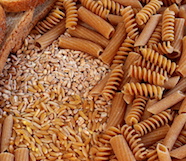Researcher profiles
- Dr Lisa Te Morenga (PI)
- Professor Jim Mann
- Dr Andrew Reynolds
- Professor Indrawati Oeuy
- Associate Professor Tracy Perry
- Associate Professor Pat Silcock
Benefits of wholegrains
Wholegrain foods are a source of nutrients and dietary fibre. Regular consumption of wholegrains is recommended in most national and international food-guidelines with the aim to reduce the incidence of non-communicable diseases, such as type 2 diabetes, cardiovascular disease and colorectal cancer.
The definition of 'wholegrain' is based on the nutrient composition of foods, rather than whether or not the structure of the grain is still intact. As a result, many of the wholegrain-labelled products that people consume contain largely refined grains. But research indicates that the structure of the grain may influence the food's effect on metabolic measurements and clinical outcomes associated with increased risk of non-communicable diseases.
Proof of concept research
The wholegrain acute studies are testing if wholegrain structure influences postprandial (after a meal) blood glucose control in people with and without type 2 diabetes. The project is investigating the following three wholegrain food products:
- Four wholegrain breads of roller-milled wholemeal flour, stoneground wholemeal flour, roller-milled wholemeal flour with kibbled wheat, and roller-milled wholemeal flour with kibbled and intact wheat.
- Four wheat porridges, two of finely milled wholemeal flour and two of kibbled wheat. One of each of these porridge types are served hot (gelatinized starch) the other porridges served cold (native starch).
- Two dry wholegrain wheat crackers, one made with whole flour, the other with kibbled wheat.
The results of these proof of concept studies will be used to inform longer term randomised controlled trials in order to provide evidence for improved dietary advice.

Funding
- Riddet Centre of Research Excellence
- Health Research Council
- Otago Southland Diabetes Research Trust
- Baking Industry Research Trust
Collaborators
Postgraduate student researchers:
- Dr Mona Elbalshy (MSc)
- Evelyn Mete (PhD)
- Caleb Robinson (PhD)